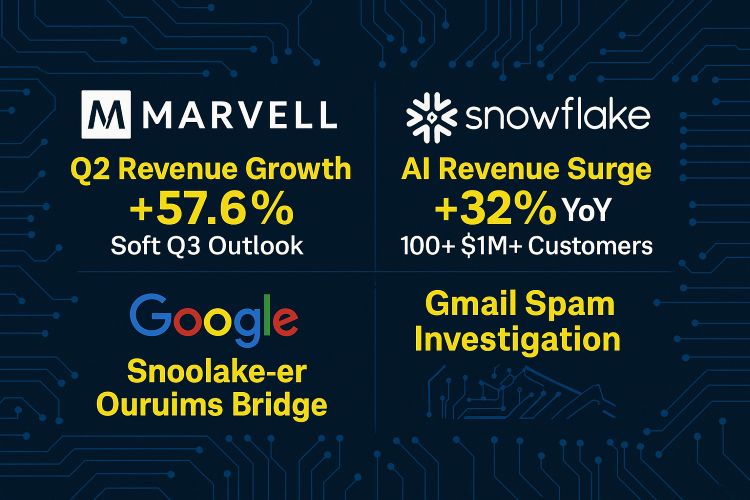AI Navigation
- articleAI Trends
- lightbulb_2AI Tips
- assistant_navigationAI Navigation
- heatHot Articles
- emergency_heat_2Hot Tips
- format_list_numberedPrompt Formatter
- psychologyTest Center(RPI)
August 29, 2025 · 24-Hour AI Briefing: Chip Market Friction, Snowflake's Data Cloud Momentum, Gmail Under Scrutiny
Over the past 24 hours, the AI and tech landscape continued evolving across multiple fronts. From Marvell’s cautious Q3 guidance despite strong ASIC sales, to Snowflake’s impressive AI-driven growth, and Google facing federal scrutiny over Gmail spam filters—these events highlight three core trends: intensifying chip competition, evolving data cloud platforms, and rising regulatory oversight on AI systems.

1. Marvell Posts Strong Q2, but Market Worries About Q3 Outlook
Marvell Technology reported revenue of $2.01 billion for Q2 FY2026, a 57.6% year-over-year increase, matching analyst expectations. Adjusted earnings per share came in at $0.67, more than double last year’s $0.30. However, the company’s Q3 revenue guidance midpoint is $2.06 billion—slightly below the $2.11 billion consensus. AI-related revenue reached $876 million for the July quarter and is expected to grow to $955 million by October, largely driven by ASIC shipments.
Comment:
After divesting its automotive Ethernet business to Infineon for $2.5 billion, Marvell is now focused on AI. While Amazon’s Trainium 2 and Google’s Axion are fueling ASIC demand, the 9% sequential growth in AI revenue disappointed investors—sending the stock down over 10% after hours. Meanwhile, competitors like Broadcom are seeing ASIC revenues surpass GPUs. Marvell’s high R&D spending continues to push costs up, adding pressure to maintain momentum in a fiercely competitive chip market.
2. Snowflake Beats Earnings, Riding AI Cloud Momentum
Snowflake’s Q2 FY2026 results exceeded expectations, with GAAP and non-GAAP revenue both hitting $1.0905 billion, up 32% year-over-year. GAAP net income was $788.2 million (72% margin), and non-GAAP income was $833.6 million (76% margin). Adjusted EPS came in at $0.35, beating the $0.27 consensus. The company expects full-year revenue to reach $4.395 billion, above the $4.34 billion forecast. Over 600 customers spent more than $1M in the last 12 months, up 30% YoY.
Comment:
Snowflake’s data cloud—particularly its Atlas architecture—has become a central piece in the AI stack, offering vector search and real-time analytics. With 751 Fortune Global 2000 clients and broad sectoral coverage (finance, retail, manufacturing), Snowflake’s enterprise traction remains robust. Multi-cloud support across AWS, Azure, and GCP further enhances its appeal. However, controlling platform costs while scaling AI capabilities remains a key challenge as it competes with hyperscalers.
3. Gmail Under FTC Investigation for Potential Political Bias
The U.S. Federal Trade Commission (FTC) is investigating Gmail’s spam filtering practices, following claims that the system unfairly flags Republican emails. Google has denied the allegations, stating that filtering is driven by objective signals, not political preferences.
Comment:
FTC Chair Andrew Ferguson is demanding transparency on Gmail’s spam filtering logic. The inquiry may push the industry toward clearer standards to avoid algorithmic bias. Google argues that Gmail uses machine learning for spam detection, which inherently involves statistical error margins. If the FTC finds evidence of political bias, it could trigger broader changes in how AI moderation systems are governed—placing Gmail at the center of a much larger accountability debate.
For more AI insights, tech trends, and industry analysis:
👉 https://iaiseek.com
To catch up on the latest developments over the past 72 hours, check out: